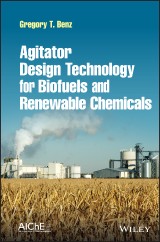Details

Agitator Design Technology for Biofuels and Renewable Chemicals
1. Aufl.
|
126,99 € |
|
| Verlag: | Wiley |
| Format: | EPUB |
| Veröffentl.: | 21.07.2022 |
| ISBN/EAN: | 9781119815518 |
| Sprache: | englisch |
| Anzahl Seiten: | 432 |
DRM-geschütztes eBook, Sie benötigen z.B. Adobe Digital Editions und eine Adobe ID zum Lesen.
Beschreibungen
<b>Agitator Design Technology for Biofuels and Renewable Chemicals</b> <p><b>Comprehensive guide to the design, installation, selection, and maintenance of agitators in the biofuels and renewable chemicals industries </b> <p><i>Agitator Design Technology for Biofuels and Renewable Chemicals</i> is a single-source reference on all the major issues related to agitator design for biofuel, written with the intention of saving the reader time by avoiding the need to consult multiple references or sift through many pages of text to find what is needed for agitator design in specific industries. The work presents a brief introduction of basic principles and relevant theory, then goes on to cover the real-world applications of these principles, including economic evaluations of alternatives as well as supplier evaluation principles. <p>To aid in quick and seamless reader comprehension, each chapter has the symbols used in that chapter listed and defined at the end. Overall, the work is written more as a how-to book than an academic treatise. The highly qualified author has included plenty of brevity throughout the pages with the hopes that readers go through the entire book as a single unit, rather than just skimming an occasional page or chapter as is common with other resources in similar fields. <p>Sample topics covered in the work include: <ul><li>Avoiding common problems, such as using impeller diameters and speeds that would not result in even minimal solids suspension or liquid motion</li> <li>Choosing the right impellers for the job, understanding how power draw and pumping are calculated, and becoming familiar with biofuel/biomass agitator sizing guidelines</li> <li>The principles and limitations of scale-up and the most common non-Newtonian rheology applicable to biofuel applications</li> <li>Designing lab tests and scale-up cellulosic hydrolysis agitation, plus the uses and limitations of Computational Fluid Dynamics (CFD)</li></ul> <p>As an easy-to-read and completely comprehensive resource to the subject, <i>Agitator Design Technology for Biofuels and Renewable Chemicals</i> is immensely valuable for professionals tasked with selecting agitation equipment or troubleshooting existing equipment, as well as those involved in planning activities and allocating resources related to project management.
<p>Foreword xix</p> <p>Foreword to <i>Agitator Design Technology for Biofuels and Renewable Chemicals</i>, Gregory T. Benz xxi</p> <p>Foreword by Dan Beacom (Beacom Consulting) xxv</p> <p>Preface xxvii</p> <p>Author Biography xxxiii</p> <p>1 Purpose of Agitator Design 1</p> <p>2 Major Steps in Successful Agitator Design 3</p> <p>3 Agitator Design Basics 11</p> <p>4 Impeller Types and Flow Patterns 35</p> <p>5 Agitator Design for Liquid Motion 71</p> <p>6 Side-Entering Agitator Design 93</p> <p>7 Application Guide for Starch and Sugar-Based Ethanol Processes 109</p> <p>8 Application Guide: Cellulosic Ethanol and Renewable Chemicals 143</p> <p>9 Biodiesel and Renewable Diesel Application Guide 165</p> <p>10 Pyrolysis Application Guide 189</p> <p>11 Agitation Scale-up 197</p> <p>12 Basic Rheology and Viscometry 217</p> <p>13 Cellulosic Materials and Hydrolysis Reactor Agitator Design 253</p> <p>14 Use of CFD in Biofuel Agitator Design 281</p> <p>15 Mechanical Design of Agitators 1: Shafts and Impellers 297</p> <p>16 Mechanical Design of Agitators 2: Gear Reducers, AKA Agitator Drives 339</p> <p>17 Vendor Evaluation 357</p> <p>18 Summary of Book 371</p> <p>Appendix 1 373</p> <p>Appendix 2 377</p> <p>Afterword 381</p> <p>Index 383</p>
<p><b>Gregory T. Benz, P.E.,</b> is the President of Benz Technology International, an engineering consulting firm and Chinese business development corporation. He has authored numerous articles, conducted more than 50 seminars, and holds a patent on a nonrotating, nonseal method of mechanically agitating tanks. </p>
<p><b>Comprehensive guide to the design, installation, selection, and maintenance of agitators in the biofuels and renewable chemicals industries </b></p> <p><i>Agitator Design Technology for Biofuels and Renewable Chemicals</i> is a single-source reference on all the major issues related to agitator design for biofuel, written with the intention of saving the reader time by avoiding the need to consult multiple references or sift through many pages of text to find what is needed for agitator design in specific industries. The work presents a brief introduction of basic principles and relevant theory, then goes on to cover the real-world applications of these principles, including economic evaluations of alternatives as well as supplier evaluation principles. <p>To aid in quick and seamless reader comprehension, each chapter has the symbols used in that chapter listed and defined at the end. Overall, the work is written more as a how-to book than an academic treatise. The highly qualified author has included plenty of brevity throughout the pages with the hopes that readers go through the entire book as a single unit, rather than just skimming an occasional page or chapter as is common with other resources in similar fields. <p>Sample topics covered in the work include: <ul><li>Avoiding common problems, such as using impeller diameters and speeds that would not result in even minimal solids suspension or liquid motion</li> <li>Choosing the right impellers for the job, understanding how power draw and pumping are calculated, and becoming familiar with biofuel/biomass agitator sizing guidelines</li> <li>The principles and limitations of scale-up and the most common non-Newtonian rheology applicable to biofuel applications</li> <li>Designing lab tests and scale-up cellulosic hydrolysis agitation, plus the uses and limitations of Computational Fluid Dynamics (CFD)</li></ul> <p>As an easy-to-read and completely comprehensive resource to the subject, <i>Agitator Design Technology for Biofuels and Renewable Chemicals</i> is immensely valuable for professionals tasked with selecting agitation equipment or troubleshooting existing equipment, as well as those involved in planning activities and allocating resources related to project management.


















